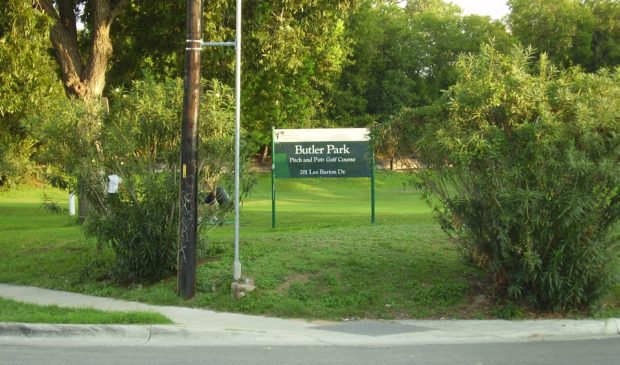Parks board critiques Butler Pitch & Putt solicitation, recommends change of hands
Thursday, May 30, 2019 by
Ryan Thornton The Parks and Recreation Board yielded to the authority of city procedure Tuesday when it passed a recommendation for Council to approve an agreement with Pecan Grove Golf Partners to take over the management of Butler Park Pitch & Putt golf course in August.
Several residents showed up to defend the longtime manager of the nine-hole golf course, Lee Kinser, from what they consider unfair treatment by the city.
The Kinser family has operated the course since opening it in 1950, and it has become a unique attraction to golfers and non-golfers alike while generating roughly $80,000 annual city revenue in recent years. Kinser may now lose that business due to a filing error in her business proposal submitted earlier this year.
As Matt Duree, procurement manager with the city’s Purchasing Office, explained, Kinser’s failure to sign the document cannot legally be corrected after a request for proposal deadline because the solicitation process prohibits acceptance of proposals “even one minute after the deadline.”
With Kinser’s contract term ending Aug. 12, the city published an RFP on March 25 and closed solicitations April 9. With Kinser’s proposal deemed “non-responsive,” staff evaluated the two other proposals and is submitting its selection, Pecan Grove Partners, for Council approval at its June 20 meeting.
The disqualification of Kinser’s proposal appears in sharp contrast to the negotiation process in August 2014, the last time the contract was due for renewal. Rather than open negotiations up to the public, Council decided in a 5-2 vote to negotiate exclusively with the Kinser family.
Without regard to the content of the other two proposals, Board Member Kim Taylor said disqualifying Kinser’s submission on the basis of a single error is a sign of a flawed solicitation process.
“These proposals can sometimes be up to 70, 80 pages long,” Taylor said. “When you spend hours and hours and hours putting these proposals together I think that they should be judged on the merit of their work, not whether or not she omits a signature.”
Duree said whether or not that criticism had merit would need to be decided by Purchasing Officer James Scarboro and City Manager Spencer Cronk before any policy revision could occur.
With an eye to Kinser’s approaching contract termination, Claudia Rodriquez, a procurement specialist with the Purchasing Office, explained that a revision of that magnitude would involve revisiting all of the office’s instructional documents, policies and procedures, and solicitation documents.
Speaking on the item, Kinser reiterated that her contract allows for a “120-day extension that can be put in place so that all of this doesn’t have to be rushed.”
By the city’s standards, Duree said, providing such an extension and reopening the RFP after it has closed would mean giving preferential treatment to Kinser’s proposal.
Kevin Gomillion, the city’s golf division manager, said staff could have reopened the RFP or made other adjustments if no suitable proposals had been received, but that was not the case this time.
Though the Pecan Grove Partners proposal was awarded 87 out of 100 possible points – more than twice that of the other submission – both applicants met the criteria outlined in the solicitation request. On key questions like preserving the course’s affordable fees, Gomillion said, both proposals fell within the city’s definition of affordable golf.
Besides maintaining the course’s cherished low fees, Anna Morales of Pecan Grove Partners said their plan is to preserve all of the features the community celebrates, including its welcoming of dogs and large families, its numerous trees and the hole-in-one wall of fame.
Parks board members were less concerned about the golf course character than the city procedures that have put Kinser, who has operated her small business for over 35 years, in this situation.
Board Member Romteen Farasat proposed taking no action on the staff recommendation to send a strong message to Council that the city needs to look into updating that solicitation process.
“Right now what I’m seeing is that a small business is being choked out, an iconic small business is being choked out in the city of Austin, and I don’t know if we have any authority at this point in time to reverse the current situation, but you know, at the very least what we can do is take this as a learning opportunity and fix it for future situations,” Farasat said.
While sympathizing with the intent, other board members preferred to take action. Following Board Member Fred Morgan’s motion of approval, Board Member Rich DePalma drafted additional language to address the solicitation process flaws and prevent a similar situation from happening again.
In particular, the board articulated the need to move away from a paper-only solicitation process and leverage existing technology that would immediately catch a missed electronic signature and send it back to the applicant for correction.
Morgan’s motion and DePalma’s amendment passed in a 9-1 vote, with Board Member Laura Cottam Sajbel voting no.
Photo by WhisperToMe [Public domain], via Wikimedia Commons.
The Austin Monitor’s work is made possible by donations from the community. Though our reporting covers donors from time to time, we are careful to keep business and editorial efforts separate while maintaining transparency. A complete list of donors is available here, and our code of ethics is explained here.
You're a community leader
And we’re honored you look to us for serious, in-depth news. You know a strong community needs local and dedicated watchdog reporting. We’re here for you and that won’t change. Now will you take the powerful next step and support our nonprofit news organization?











